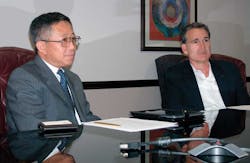Coming off a record year financially, Yokohama Tire Corp. shook things up a little in 2011. First it promoted Dan King to senior vice president of sales and marketing.
Then it paired him up with a new CEO and president, Yasushi Tanaka, at mid-year. The partnership worked.
Their chemistry was evident during a recent interview at the company's home office in Fullerton, Calif. Tanaka brings insight from outside Yokohama Tire Corp. as a corporate officer of Yokohama Rubber Co. Ltd. in Tokyo, Japan. King is the insider, with the company knowledge that comes from 23 years of experience.
Tanaka was instrumental in the formation of the Grand Design 100 long-term global business plan, which ends in 2017, Yokohama Rubber Co.’s centennial anniversary. Phase three begins in 2012, and will focus on deploying environmentally-friendly products, winning original equipment fitments, strengthening the company’s presence in Russia and expanding production capacity globally.
MTD: Yokohama’s “BluEarth” environmental commitment is part of the Grand Design 100 plan. Please explain what it is all about.
Tanaka: One of Yokohama’s core policies is to deal fairly with society and value harmony with the environment. As a manufacturer, we at Yokohama live out this commitment from our manufacturing activities to product design/materials and product performance. As far back as 1998, for example, we have had our Mie Plant in Japan ISO14001-certified. Today, all of our manufacturing plants, including the facility in Salem, Va., are ISO14001-certified.
In 1998 also, Yokohama introduced the DNA series of eco tires. These were environmentally-friendly tires that improved rolling resistance by 10% over previous models and improved fuel consumption. In 2007, the world’s first consumer tires blended of orange oil compounding have been introduced by Yokohama.
Today, the BluEarth-1 tire, based on the latest orange oil technology, has launched and is available for sale in Japan and Europe. It is a successful product for improving fuel economy. Subsequently, it is planned for sale in North America. It is currently on exhibit at the Boston Museum of Science. We intend to announce BluEarth as our overall environmental concept as well.
King: BluEarth is an umbrella name for our focus on the environment and, in particular, environmental technologies. We have initiated our own internal requirements for our products so that if a product meets them, we can then say it’s part of our BluEarth initiatives. It also will be a brand. We have some products that will be marketed in the U.S. under the BluEarth name.
MTD: Another element of Grand Design 100 is expanding production capacity. How has that affected production at the Salem plant? We estimated the plant capacity entering 2011 was 24,000 consumer tires a day.
King: We increased capacity this year, but we also changed the type of output. We focused on larger diameter performance tires and light truck tires. We also announced an additional $13 million investment during this year. So we increased not only the output but also the size of the tires produced there.
We’re looking at increasing production there even more, but the question is, how do we increase it? We decided to use the existing framework and try to get as much out of it as we can, and then look at our plant in the Philippines for further expansion. There’s also some review of Thailand, and how we can expand our plant there, too. We have as well a new plant in Russia. Although the products we produce there are targeted for the Russian market, they help us with the logistics of managing our global capacity.
Tanaka: We have not changed the configuration of the walls in Salem since we purchased it in the late ’80s. That has limited us a little bit. However, there’s not a single bit of equipment still in the plant that was there when we bought it.
King: There’s been some discussion back and forth on whether that’s the best direction for us because it wouldn’t be as easy as expanding in some of the other areas in which we have plants, like Thailand, where we have a lot bigger facility.
[PAGEBREAK]
MTD: Might your expansion plans include building a new plant in the U.S.?
Tanaka: I hope.
King: We are always evaluating that, because of the success we’ve had with Salem. The cost structures are higher, unfortunately, in the U.S., much higher than they are in the Philippines or Thailand. But there are some additional benefits that we gain from having a plant close to the market. So our parent company understands that. They’re always evaluating it. That’s something we don’t want to forget about. We want to keep pushing that idea.
MTD: I know you need to meet demand, but I would think you have to be careful you don’t expand too fast.
King: We pride ourselves on being connected to our dealers and giving them the best possible fill rate. Sometimes we can’t fill the demand; when that happens, it is important to let them know, and tell them what we can commit to. They are our real partner. They’re the ones who are going to help us with our brand in the marketplace.
MTD: What tires do you manufacture in the Salem plant?
King: The majority of the lines made there are Yokohama brand passenger and light truck tires. They include the Yokohama AVID ENVigor, our new performance product, which has been extremely successful for us. It was probably the most successful launch we’ve had in some time. Consumers are coming back to the dealers asking for it, so it’s put a lot of pressure on the production capacity. Luckily, thanks to our expansion in Salem, we’ve been able to meet some of that demand, but we still have some issues with fill rates.
The majority of our Geolander H/T-S light truck tires are built at Salem as well. Our primary touring product, the AVID TRZ, is 100% built in Salem. So is our core passenger line, the AVID Touring S. These are all really important products for us and our dealers, who like the fact that a lot of our products are built right here in the U.S. And being built in the U.S. also allows them to get these products as soon as possible.
MTD: Does your parent company consider the United States a major growth market?
King: We are Yokohama Rubber's largest subsidiary globally. Our growth is a vital part of the Grand Design 100. Even though the country is going through some economic turmoil, the U.S. is still a major growth market, and even if it only grows 2-3%, that’s huge. Other countries might be growing at a 10% rate, but those increases are based on smaller numbers.
Tanaka: The American market is very stable and, like the European market, it is quite often open to fair trade. So if you have a suitable product to offer here, we can be successful. However, in China, the market may be huge and growing, but in my opinion it is still a closed market.
About the Author

Bob Ulrich
Bob Ulrich was named Modern Tire Dealer editor in August 2000 and retired in January 2020. He joined the magazine in 1985 as assistant editor, and had been responsible for gathering statistical information for MTD's "Facts Issue" since 1993. He won numerous awards for editorial and feature writing, including five gold medals from the International Automotive Media Association. Bob earned a B.A. in English literature from Ohio Northern University and has a law degree from the University of Akron.
